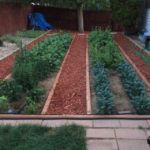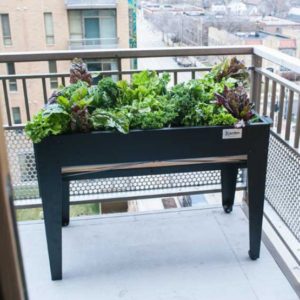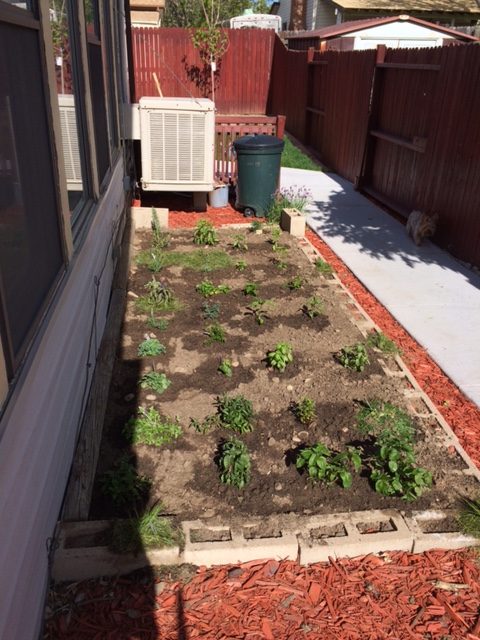Sitting here in Istanbul, Turkey, I look around and see thousands upon thousands of apartments with a common theme – many of the residents are growing their own little gardens in small pots outside their windows and on their balconies.
Have you ever thought about having a small garden and growing your own food or part of it? It’s not that difficult and can be lots of fun. I find it to be a needed stress relief simply working patiently in my garden. Not only can you save money and eat better food, but learning how to provide for your family without depending on outside sources is practical and prudent. Also, planning and planting a small garden is a very wise decision in today’s economy with unsure stock markets and constriction of companies who lay off workers by the thousands.

It wasn’t that long ago that most people grew their own gardens. In the 1950s, we saw the emergence of the big corporate farms that grew monoculture crops on hundreds and thousands of acres to keep pace with a growing population. During this time, the small mom and pop farms disappeared, along with most people’s ability to grow their own food.
In the new farming operations – 1 crop ( a monoculture) like corn, grown on thousands of acres, as the crops were rotated, needed micronutrients for your body began to decline. While these large farms use tons of fertilizers annually, they are in the form or N-P-K or nitrogen, phosphorus, and potassium. Although macronutrients as they are called are usually replaced by the corporate farmer, the micronutrients so needed by the body are not and thus, continually dwindle every day. This has resulted in that for many instances, you cannot get enough of the needed micronutrients the body needs from food alone.
So, your own gardening skills to the rescue. Planting some herbs for antioxidant purposes and your own food, even on your back patio or in pots will help, not to mention giving you that exuberant feeling of self-reliance, after all, we came from a hunter-gatherer society where all of our ancestors had all of these skills. Plus, there is great satisfaction in watching a plant grow from a tiny see to maturity for which you can say, “I did that!”
I initially planted my herbs in small pots and containers. You would be surprised at how resilient the plants are. Just water them and give them a little care and each plant will produce quite a bit. As an example, both oregano and Thyme are full of antioxidants. I mix a few of their leaves in with my mint tea – the mint is also grown in my garden and not heated. The leaves are crushed a little, put into a basket and then allowed to stand overnight in the fridge before drinking. It’s a refreshing drink that tastes good and is good for you.
Many people who live in apartments are squeezed for space thus, a container garden can be the perfect solution or a beautiful patio garden – both can provide an abundance of fresh vegetables. Even that take-home food container you brought home last night can be used to plant an herb or leafy-green vegetable in. A square foot container and other small plot garden plans also are perfect for growing vegetables when space and or time are limited. Vegetable plants can also be added to an existing border of the yard or flower bed. More importantly, we are only limited by our imagination.
I took out half my back yard, which is small compared to the large home I used to reside in. It only took a day to build the containers and mulch around them. I still have lots of grass for my puppies, but produced enough food for myself for the entire summer, as well as my cousin’s soul-food truck, especially collards, kale, and other greens.
Garden Pics here
Growing your own tomatoes, lettuce, cucumbers, carrots, peppers, and more is easily done in even the smallest garden spaces. A do-it-yourself bed (raised bed), as seen in the photos, can be the perfect fit for many gardening needs. Surrounding it with mulch makes it easy to work in during winter and summer months, without the mud to track inside. Let your imagination run and see what you come up with.
Even if you don’t have a large backyard, with a little creativity you can build a raised bed or container garden in sunny location in your yard or on your patio, porch, deck, or balcony. Also, you can now get portable containers for small herb and vegetable gardens from Home Depot, Lowes, and similar stores, including Walmart. So, don’t let not having a yard hold you back.
Advertisement: Hayneedle (click on photo for more info). Hayneedle has
many professional containers for all budgets)

There is nothing like the feeling you get when you first harvest an herb or vegetable that you didn’t buy from the store. Savor the experience and let it wash your stress away as you care for your garden a few minutes each day after work. You can relax and bask in the good feelings you get from it.
Before you attempt to grow the largest garden in the neighborhood, but are short on space and time, do my three-pot challenge or large container challenge. Pick several pots, that are at least a foot square at the top or a container that is say 1 x 3 feet and about a foot deep. Place it or them where they get about 4 hours of sunlight (minimum) during the day and plant herbs, some greens, and another variety of vegetable of your choice.
Beginner vegetable gardens come in all shapes and sizes; large, small, and in-between. I’ve used everything from egg cartons to 5-gallon buckets from Home Depot to more professionally designed containers. All of them work – be patient and relax. In a crowded landscape, your garden may need to take the shape of a sharp bend, half circle, a single container, almost anything due to space constraints – let nothing stop you.
You can interplant large with small varieties of vegetables, use dwarf varieties to cram more plants into a small space, and scatter seeds into a small area rather than trying to plant them in a row. A trellis also is a good way to maximize a small space, as well as a large 12-inch diameter PVC pipe with holes cut along the side to plant in – such designs are called vertical gardens and are quite common for herbs, strawberries, small tomatoes, cucumbers, cantaloupe, and other vegetables. Whatever method you use, the productivity will surprise you.
Be creative and, if you get stuck contact me and I’ll be happy to share some tips. This is just the beginning, next time, we’ll begin talking about planning a garden that will feed 7 people for a year in a temperate climate. A project I started some years back, which is running successfully in 12 Latin-American countries where, due to continuous tropical weather, the project supports 21 people for one year on 2.5 acres (1 hectare). Until next time.







